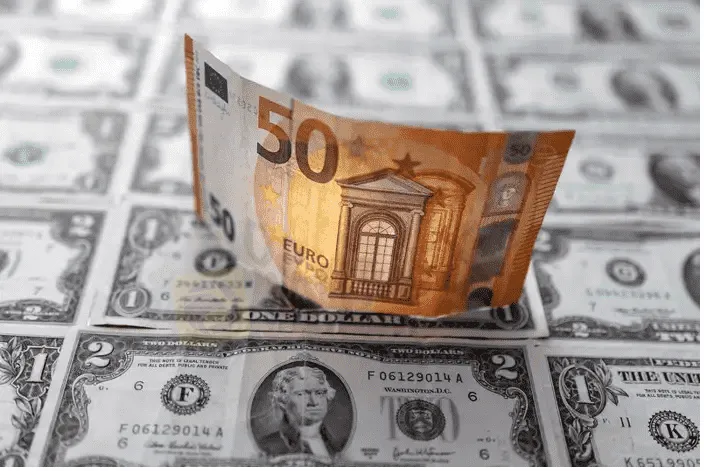简体中文
繁體中文
English
Pусский
日本語
ภาษาไทย
Tiếng Việt
Bahasa Indonesia
Español
हिन्दी
Filippiiniläinen
Français
Deutsch
Português
Türkçe
한국어
العربية
Euro hovers above parity before U.S. inflation data
Abstract:The euro hovered a whisker above parity on the dollar on Wednesday ahead of U.S. inflation data, with traders wary a sky-high reading could force it to lows not seen in decades.

The euro was hovering just above parity with the U.S. dollar on Wednesday while traders focused on U.S. data due later in the session that is expected to show inflation at a 40-year high.
European stock markets were in the red and currency markets were calm in early European trading, with the dollar index up by around 0.1% at 108.33.
The euro was down 0.2% on the day at 1.00375 at 0804 GMT.
On Tuesday, it had dropped as low as $1.00005 on the most widely used Electronic Broking Services (EBS) dealing platform and touched $1 on Reuters dealing overnight.
Market-watchers were focused on U.S. CPI data due later in the session. Economists forecast headline U.S. inflation accelerated to 8.8% year-on-year in June, a four-decade high.
But “core” CPI, which strips away volatile food and energy prices, is expected to repeat Mays 0.6% monthly increase and cool slightly to 5.7% year-on-year.
Higher-than-forecast inflation would reinforce expectations of Federal Reserve interest rate hikes and push the dollar higher – potentially causing euro-dollar to break parity, analysts said.
But traders will be looking for any signs of inflation having peaked, as this could potentially convince the U.S. central bank not to become more aggressive in its future rate hikes.
The euro is down nearly 12% this year and fell to a 20-year low on Tuesday, as the war in Ukraine has triggered an energy crisis that has hurt the continents growth outlook.
Germany has moved to stage two of a three-tier emergency gas plan and warned of a recession if Russian gas flows are halted.
“I see relative recession risks as the primary driver of the drop towards parity – Dutch gas futures are up 100% over the last month, U.S. gas futures are down 35%. This is a clear negative for euro zone growth and is dragging the euro lower,” said Colin Asher senior economist Mizuho.
Derek Halpenny, head of research at MUFG, said in a client note that risk-off market moves due to increased global recession risks have “further to run”.
“We doubt that is the end of the move and see little reason for the US dollar to turn weaker at this juncture,” he said.
The euro was down by around 0.1% versus the British pound, with the euro-sterling pair having fallen 2% so far this month.
“The markets treating the euro zone as worse off than the UK when it comes to the gas flow,” said Jordan Rochester, FX analyst at Nomura.
The pound was up 0.2% versus the dollar at $1.19055.
Britains economy expanded unexpectedly in May, driven by a rise in local doctor appointments and growth in other sectors although consumer-facing services fell slightly as inflation mounted, according to official figures.
The Japanese yen was a touch lower versus the U.S. dollar at 127.075, having taken a beating in recent months due to the Bank of Japans ultra-easy monetary policy making it an outlier among major global central banks.
The Australian dollar – seen as a liquid proxy for risk appetite – was up 0.2% at $0.67700.
The New Zealand dollar was up 0.1% at $0.6134, having taken little support from a 50 bps interest rate hike by the countrys central bank.


Disclaimer:
The views in this article only represent the author's personal views, and do not constitute investment advice on this platform. This platform does not guarantee the accuracy, completeness and timeliness of the information in the article, and will not be liable for any loss caused by the use of or reliance on the information in the article.
Read more

CMC Markets: A Closer Look at Its Trading Environment
CMC Markets provides access to four trading platforms: MetaTrader 4 (MT4), MetaTrader 5 (MT5), TradingView, and its proprietary web platform. Each platform supports different tools, asset classes, and execution features.

He Lost RM275,000 to a Fraudulent "Moomoo" Scam
A 57-year-old engineer lost RM275000 in an online investment scam that misused the name of a well-known trading platform, Moomoo. The scam was promoted through a Facebook advertisement in April and led the victim to believe he was engaging in a credible investment opportunity.

The Hidden Dangers of Viral Trading Advice
Do you turn to social media for trading advice? If yes, do you know that much of what you are consuming could be doing more harm than good?

Forex Trading Lot Size: Decide it Right to Reap the Right Results
Determining the right forex trading lot size is pivotal to enjoying a long run in the forex market. Go through this guide to know how to do it.
WikiFX Broker
Latest News
Stablecoins go mainstream: Why banks and credit card firms are issuing their own crypto tokens
The Dollar Keeps Falling: How Should We View Exchange Rate Volatility?
Asia-Pacific markets rise as investors parse a slew of data releases
Asia-Pacific markets mostly rise as investors parse a slew of data releases
WikiFX Gala Night Malaysia Concludes Successfully
IG Group Unlocks Over £425 Million amid a Capital Reduction
Gold Prices Fall by INR 39,300 in the Last Week? What's Next Week's Outlook?
European stocks open slightly higher as UK-U.S. trade deal cuts autos, aviation tariffs
Treasury yields tick lower as Trump's spending bill in focus
European stocks mixed as UK-U.S. trade deal cuts autos, aviation tariffs
Currency Calculator


